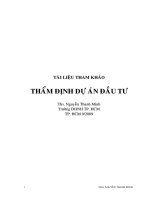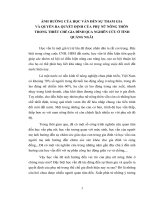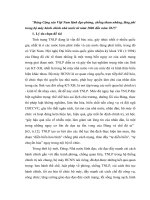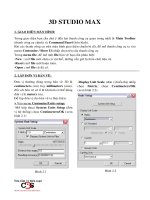tai lieu tham khao
Bạn đang xem bản rút gọn của tài liệu. Xem và tải ngay bản đầy đủ của tài liệu tại đây (1.33 MB, 20 trang )
<span class='text_page_counter'>(1)</span><div class='page_container' data-page=1>
Welcome to your present
• <sub>Editor by </sub>
• <sub>Nguyen Thi Tu</sub>
• <sub> Nguyen Thi Huyen</sub>
</div>
<span class='text_page_counter'>(2)</span><div class='page_container' data-page=2>
Effects of the sun
• <sub>The good </sub>
</div>
<span class='text_page_counter'>(3)</span><div class='page_container' data-page=3>
Effect of the sun
• The bad effects: The sun
can present us with danger
as well. Many of us do not
understand the hidden
</div>
<span class='text_page_counter'>(4)</span><div class='page_container' data-page=4>
Factors raise a person’s risk
of getting melanoma (1)
• <sub>Hereditary factors are factors you are born </sub>
with, your general genetic make up, things
like your skin and hair color. Dark-skinned
Asians and Hispanics are 50 times less
likely than light-skinned and light-eyed
</div>
<span class='text_page_counter'>(5)</span><div class='page_container' data-page=5>
Factors raise a person’s risk
of getting melanoma (2)
• <sub>Environmental factor also influence your </sub>
chances of contracting the disease,
geography is associated with the incidence
of skin cancer. The farther north or south of
the equator you are, the less likely you are
to get skin cancer because the sun’s ray are
not directly overhead, but instead hit the
</div>
<span class='text_page_counter'>(6)</span><div class='page_container' data-page=6>
Factors raise a person’s risk
of getting melanoma (3)
• <sub>Behavioral factor is the history of the person, the </sub>
amount of exposure to the sun that the person has
had from birth on. We can say that it’s quite clear
that getting sunburned frequently and severely
early in our lives can have negative consequences
later on. This means that parents, especially, are
educated about the dangers of this problem so that
they can try to keep their children protected. It
</div>
<span class='text_page_counter'>(7)</span><div class='page_container' data-page=7>
How to protect ourselves
from the sun
<b> - We can make people more aware of </b>
<b>the danger of too much sunbathing </b>
<b>for skin through radio, TV, </b>
</div>
<span class='text_page_counter'>(8)</span><div class='page_container' data-page=8>
Apply lots of sunscreens
(1)
Use sunscreen on all
exposed skin. Your
sunscreen should
have a sun protection
factor (SPF) of at
least 15. your
sunscreen should
protect you from both
ultraviolet A (UVA)
and ultraviolet B
</div>
<span class='text_page_counter'>(9)</span><div class='page_container' data-page=9>
Apply lots of sunscreens
(2)
• <sub>Do not forget to apply sunscreen to your </sub>
</div>
<span class='text_page_counter'>(10)</span><div class='page_container' data-page=10>
Apply lots of suncreens (3)
• <sub>Also, apply it under bathing suit straps, </sub>
necklaces, bracelets, and sunglasses.
• <sub>You should put on one ounce of sunscreen </sub>
every two hours-one ounce is about the size
of a ping pong ball.
</div>
<span class='text_page_counter'>(11)</span><div class='page_container' data-page=11>
Apply lots of suncreens(4)
•
<sub>*Besides protecting you from </sub>
sunburn, sun screams help to
</div>
<span class='text_page_counter'>(12)</span><div class='page_container' data-page=12>
<b>Apply lots of </b>
<b>suncreens(5): </b>
<b>Types of Sunscreens</b>
• PABA-free (PABA is a
chemical that some people
are allergic to – most
sunscreens are now
PABA-free.)
• Noncomedogenic or
oil-free sunscreens (will not
clog pores.)
• Sprays, lotions, gels, etc. –
sunscreen comes in many
different forms to suit
</div>
<span class='text_page_counter'>(13)</span><div class='page_container' data-page=13>
<b>WEAR PROTECTIVE </b>
<b>CLOTHING</b>
<b>(1)</b>
• <b><sub>Clothes:</sub></b><sub> Clothes </sub>
designed to cover the
most skin provide the
most protection.
Long-sleeved shirts with
collars, long pants, and
shoes and socks
</div>
<span class='text_page_counter'>(14)</span><div class='page_container' data-page=14>
<b>WEAR PROTECTIVE </b>
<b>CLOTHING</b>
<b>(2)</b>
• <b>Hats:</b> The most sun
protective hats have a
wide brim all the way
around. Other hats, such
as baseball caps, can also
provide some sun
protection – just
remember to also use sun
scream or a gaiter to
</div>
<span class='text_page_counter'>(15)</span><div class='page_container' data-page=15>
<b>WEAR PROTECTIVE </b>
<b>CLOTHING</b>
<b>(3)</b>
</div>
<span class='text_page_counter'>(16)</span><div class='page_container' data-page=16>
<b>Wear sunglasses</b>
• <sub>Wearing sunglasses </sub>
protects your eyes from
harmful UV rays when
outdoors.
• <sub>Choose sunglasses with </sub>
99 to 100 percent UVA
and UVB protection, to
block both forms of
</div>
<span class='text_page_counter'>(17)</span><div class='page_container' data-page=17>
Be careful near water, snow,
and sand
• <sub>Water, snow, and sand can reflect the </sub>
</div>
<span class='text_page_counter'>(18)</span><div class='page_container' data-page=18>
Sit in the shade
• <sub>Remember that the sun’s UV rays are </sub>
</div>
<span class='text_page_counter'>(19)</span><div class='page_container' data-page=19>
<b>Get Vitamin D safely</b>
<b>.</b>
• Vitamin D is an important
vitamin that our bodies
make when we are out in
the sun. But there are
other ways to get vitamin
D without being in the
sun. You can get vitamin
D through fortified milk
and orange juice, cheese,
butter, cereals, and fish.
You can also get vitamin
D through vitamin
</div>
<span class='text_page_counter'>(20)</span><div class='page_container' data-page=20></div>
<!--links-->









